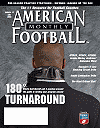AMERICAN FOOTBALL MONTHLY THE #1 RESOURCE FOR FOOTBALL COACHES
Article CategoriesAFM Magazine
|
How to Climb the Coaching Ladder of Successby: Chuck KlausingFormer Head Coach, Indiana (PA) and Carn © More from this issue American Football Monthly asked me about climbing the coaching ladder of success. I had to go to Webster’s Dictionary to define what success is. Some words I found are “to do well, achieve, or gain satisfaction from your accomplishments.” Some people believe it is to lead your team to win the Super Bowl, to be#1 in Division I football, to be Coach of the Year. These are all satisfying accomplishments but I believe it is satisfying just to coach this great game of football. Let me try to explain how some of my friends and acquaintances “Climbed the Coaching Ladder of Success.” Bobby Bowden I worked for Bobby Bowden at West Virginia University. I learned from an expert. Bobby Bowden started as a head coach in junior college and small college football. He took an assistant job at Florida State University under Bill Peterson, who was the passing expert of his day. Bobby learned the passing game that took him to a coordinator’s position and on to a head coach, and eventually back to Florida State University. Joe Paterno I helped beat Penn State and Joe Paterno three out of three times while at Army but lost six out of six while at West Virginia University. I have even coached Joe’s son while at the Kiski School in Saltsburg, PA. Joe started as a Grad Assistant at Penn State but his strength was patience. He was an assistant for many years and had opportunities to leave for head coaching positions elsewhere. He was smart to wait for his chance at Penn State. Paul Dietzel Paul Dietzel was an assistant to great coaches. Paul was an assistant to Sid Gilman at Cincinnati and to Bear Bryant at Kentucky. When he became the head coach at LSU, he was prepared for great organization and motivational abilities. Tom Cahill Tom was Coach of the Year while at Army. Tom and I lived in the same duplex for four years at West Point. I was impatient and took the head coaching job at IUP. Tom had great communication skills and surrounded himself with a great staff. Frank Cignetti Frank and I were coordinators at WVU under Bobby Bowden. Again, I was impatient and took the head coaching job at Carnegie Mellon University. Frank stayed and became the head coach at WVU when Bowden left. Unfortunately, he was sick with cancer. He won the big battle but lost his job. He proved again he could climb the ladder and became one of the winningest coaches in NCAA Division II. Frank is a good disciplinarian and highly organized. Chuck Knox We were young high head coaches in Western Pennsylvania. We taught six classes a day and coached after school. When I became a college assistant, he went with me to his first national convention. When he was interviewed for a job, he impressed everyone with his teaching ability. Chuck Noll I spent a week in Steeler camp each year observing Chuck. His strength was his teaching ability he learned from Paul Brown. Joe Pendry and George Henshaw They were graduate assistants when I was the Assistant Head Coach at WVU. A year later they became position coaches. George became the offensive coordinator with the NFL New York Giants and Joe, the offensive coordinator with the NFL Carolina Panthers. Terry Bowden Terry played for me at WVU and he was a keen student of the game. He worked as a grad assistant for his dad at FSU. Terry worked hard to develop his communication skills which has helped him climb the ladder. Frank Kush I worked for Frank when he coached the Hamilton Tiger-Cats. Anyone who has been around Frank would tell you he is the greatest disciplinarian. I believe no one would emphasize techniques and fundamentals more than Frank. Rey Dempsey Rey, who won the Division I-AA Championship at Southern Illinois, played for me in high school. He became an expert in special teams. He studied communication skills and when he got an interview, he usually got the job. Mike Gottfried I was Mike’s Assistant Head Coach at Pitt. Mike was an expert of the passing game but I believe his strength was in recruiting. If he got his shoes under the kitchen table, he usually got his man. Let’s review some of the ways to “Climb the Coaching Ladder of Success”: 1. Learn from an expert 2. Start as a graduate assistant 3. Be patient 4. Be an assistant to a great coach 5. Be organized 6. Be able to motivate 7. Develop your communication skills 8. Surround yourself with a great staff 9. Be a good disciplinarian 10. Be a good teacher 11. Become an expert in some phase of the game 12. Be a good recruiter This is how I have observed friends of mine who have climbed the coaching ladder of success. Legendary coach Chuck Klausing had a remarkable 46 year career as a coach, compiling a 310-112-10 record as both an assistant and head coach. |
|
| HOME |
MAGAZINE |
SUBSCRIBE | ONLINE COLUMNISTS | COACHING VIDEOS |
Copyright 2025, AmericanFootballMonthly.com
All Rights Reserved




